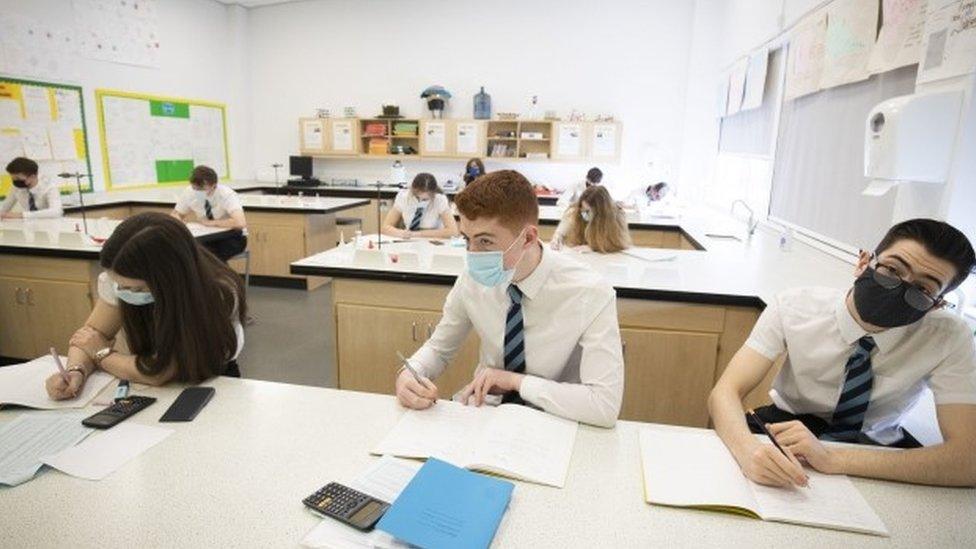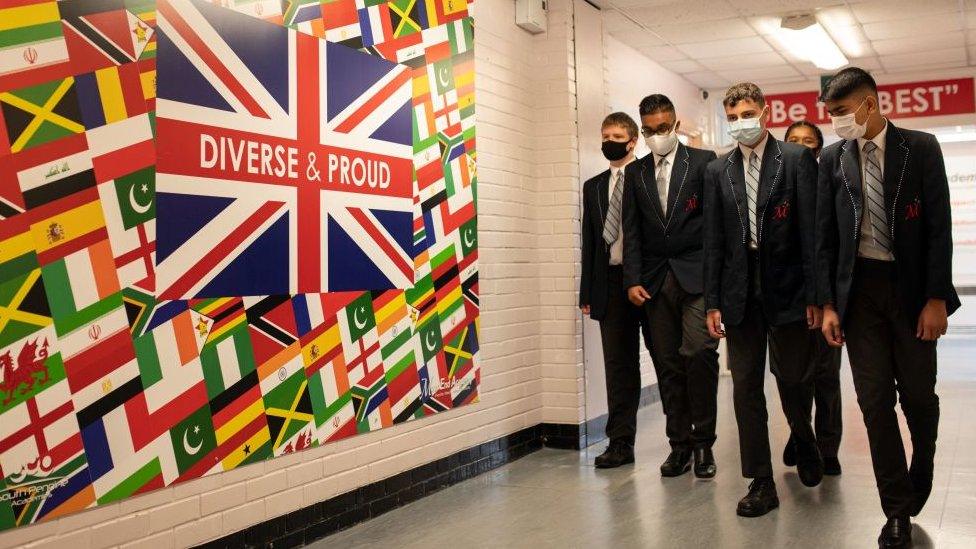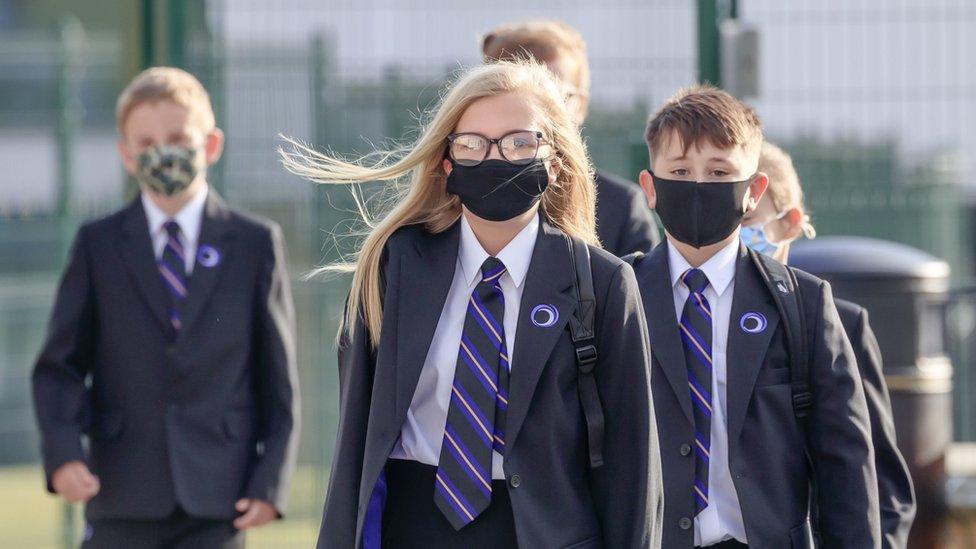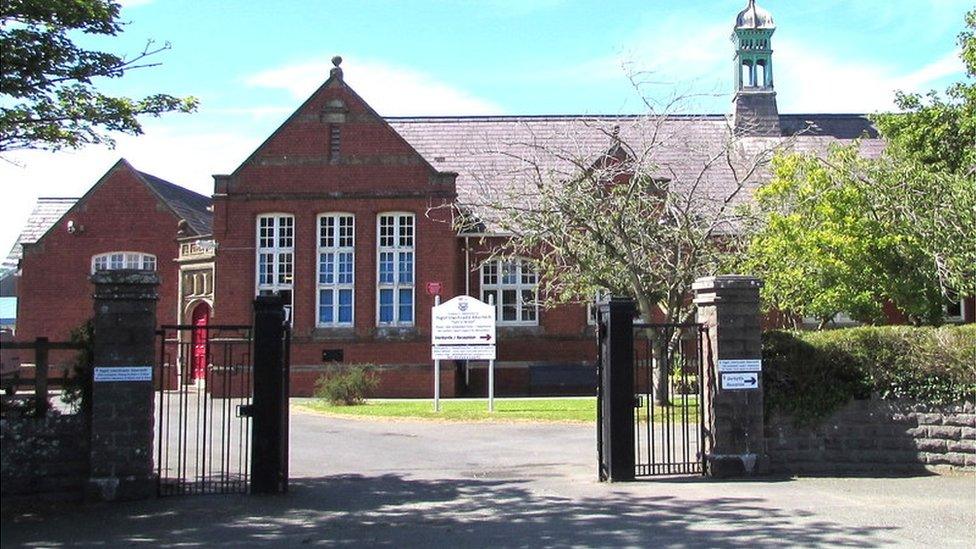Covid-19: Masks compulsory in Welsh schools communal areas
- Published

Pupils in Scotland wear masks in class in areas with higher case rates but this will not be applied in Wales
Face coverings should be worn in all areas outside classes in all secondary schools in Wales, including playgrounds.
That is the new recommendation from ministers to secondary schools, to ensure consistency across Wales.
Most councils already require or strongly advise senior pupils and staff to wear masks in areas like corridors.
This also applies to most school transport for secondary age pupils, and in some cases primary pupils too.
The guidance, which the education minister said was "simple to follow", now states that face coverings should be worn:
In all areas outside the classroom by staff and learners in secondary schools and colleges
On dedicated school and college transport for learners in year 7 and up
By visitors to all schools and colleges, including parents and carers dropping off and picking up children
Although not technically compulsory, schools will be expected to follow the updated guidance, which is based on new scientific advice to ministers on the impact of Coronavirus on children and young people., external
Education Minister Kirsty Williams said: "It is vital that young people, parents, adults and the workforce feel confident that all measures are being taken to ensure the educational environments are as safe as possible.
"We have been clear that we will keep every policy under review and will continue to follow scientific advice. The policy we are announcing today does just that."
Plaid Cymru said the guidance was "overdue", calling for ministers to incorporate further safety measures such as mass testing schemes and "proper ventilation".
And headteachers union NAHT Cymru called for the government to be clearer.
"Saying face coverings 'should' be worn, rather than they 'must' be, only leaves confusion for anxious families and staff, and could lead to a mixed economy across Wales", director Laura Doel said.
But Debbie Thomas, head of policy at the National Deaf Children's Society Cymru, said "face masks and coverings in communal areas could have serious consequences for Wales' 2,500 deaf children, almost all of whom rely on lip reading and facial expressions to communicate".
"Public health is the priority, but schools and colleges must move quickly to introduce reasonable adjustments to help deaf young people during this difficult time," she said.
What do the schools say?
Wearing masks around school I feel a lot safer. It's a normal everyday thing now.
Blaenau Gwent has the highest case rate in Wales currently and it has continued to rise, even though Covid cases have started declining elsewhere in the south Wales valleys.
Both the county's secondary schools and more than 84% of its 36 primary schools have experience of at least one positive case since September - the highest proportion in Wales.
Secondary pupils at Ebbw Fawr Learning Community weren't required to wear face masks at the start of term but that changed when cases in the area started increasing.
The school took delivery of a supply of face coverings from the Welsh Government last week.
Leon, 13, said: "Wearing masks around school I feel a lot safer. It's a normal everyday thing now. People don't realise how much it can affect people - until someone like your grandparents get it, then it impacts you really hard."
Daniella, 12, said: "I feel I'm keeping others safe, teachers safe. Maybe we could wear them more in classes but I'm not sure if it helps as much.
"If the teachers feel we need to wear masks to keep them safe and others safe, then it's a good idea."
'Extra message'
Nanci, 12, added: "It works really well - everyone's used to it and most people are complying.
"But we have to look at the practicalities of wearing them in classes. We need to speak and we're already in a bubble so wearing then would make it harder to speak to teachers and everybody."
Huw Lloyd, head of Ebbw Fawr Learning Community, welcomed a national position on face coverings.
"The communication from government is really, really important because of some of the cracks, if you like, in our policy at the moment," he said.
"You've still got one or two parents, not a lot now, who will say well that's just a Blaenau Gwent policy etc.
"Every colleague I know who is leading a secondary school, they're all wearing them in any case so that extra message would make it easier for us to manage the cases of non-compliance."
'Testing is important'
In Cardiff, Eastern High School's new buildings are less than three years old and Armando Di-Finizio, its head teacher, is confident its design helps.
"When you're in buildings like ours which are very open, you don't have to wear them [masks] in communal spaces, we don't make them mandatory," he said. "It's all about teachers in classrooms, when they get close to young people, they need to be wearing masks."
Mr Di-Finizio said testing was important because they did not know how many students were asymptomatic - and he wants hard data to see how safe schools are. "It would allow us not to have to isolate students all the time."
In Scotland, 16 and 17 year olds in the worst affected areas are required to wear face coverings in class.
But the Welsh Government guidance stops short of this.
Mr Lloyd said any move towards introducing face coverings in classrooms would need careful consideration.

Students at an academy school in Yorkshire wearing masks in communal areas
What does the science say?
The move follows a recommendation from the Welsh Government's Technical Advisory Group (Tag) looking at the "possibility of wearing face coverings for older age groups in more circumstances, including on public and dedicated transport" and could "even include in the classroom on a risk assessed basis…. balancing benefits with harms to overall wellbeing of students."
It also recommends looking at the feasibility of a mass asymptomatic testing programme in schools and colleges, which the Welsh Government says it is considering.
Dr Gavin Morgan, psychologist from University College London and also member of SPI-B advisory group - a sub group of the UK government's Sage committee - said mask-wearing in classrooms could lead to "significant impacts" on both mental health and the ability to learn and communicate.
While mask-wearing in communal areas needed to be planned for and managed by each individual school, "knowing their children and knowing their community", he added.
"They would need to educate, they would need to tell children, they would need to reassure children as to what is going on and why it is happening," he said.
"I would have the upmost confidence that all schools would be able to manage that in a sensitive and appropriate way."
- Published15 November 2020

- Published23 November 2020

- Published28 May 2024
